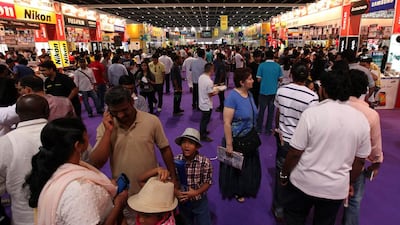Retailers are hoping to ring up two months worth of sales in just over a week as Dubai’s largest consumer electronics event got under way on Saturday.
Gitex Shopper runs until Saturday at Dubai World Trade Centre, featuring some of the industry’s biggest players.
Last year the event welcomed 206,000 people who spent Dh237 million over the eight days. Both organisers and retailers are hoping the timing of the show will help ensure it will be even more successful this year.
The UAE’s consumer electronic devices market, which includes computers and mobile handsets, is worth about Dh13.9 billion today and is projected to increase to Dh15.7bn by 2015, according to Dubai Chamber.
And a report by Gfk Temax found that the market totalled Dh3.8bn in the second quarter of this year compared with Dh3.5bn a year earlier .
“We look at it as being two months worth of sales in eight days and we have Eid to look forward to after that, so it should be a busy period,” said Ashish Panjabi, the chief operating officer of Jacky’s.
“We hope to get Saudi tourists and the GCC tourists in here as well so we are expecting the last three days to be madness.”
Earlier this year, electronics retailers said they were targeting sales increases of between 8 per cent and 55 per cent in 2013 on the back of new product launches and outlet expansion. Consumer spending in the Emirates is robust amid record levels of new personal lending.
Retailers such as Plug-Ins will likely receive a boost from launches taking place at the event, with brands including LG, Nokia and Samsung using the event to showcase their latest products.
“Over the years, we’ve seen the shopper grow both in terms of size, participants and attendees,” said Sean Connor, general manager of Plug-Ins.
“This year we expect a 25 per cent increase in sales,” he added.
Nokia unveiled its 1020 to the public, a 41-mega pixel camera smartphone costing Dh2,699, which is expected to do well in the region, according to Vithesh Reddy, the general manager for the lower Gulf at Nokia.
“What is starting to change is how consumers want to use their devices and when they want to take pictures and how they want to take pictures. It puts Nokia into a new realm of innovation,” said Mr Reddy.
“We know that Nokia is a household name to most people who live in the Middle East. Over and above that imaging is becoming more and more important in the Middle East markets.”
Mr Reddy refused to reveal the company’s market share in the region, but said it was healthier compared with some other parts of the world.
“Nokia is still in good demand, still doing extremely well and growing. It is one of the priority markets for Nokia globally,” he added.
The Middle East is also becoming increasingly more important to LG, which used the event to launch its curved Oled TV, the latest in TV technology.
The 55-inch TV costs Dh35,000, substantially more than other TVs of a similar size which typically retail for Dh6,000 to Dh13,000.
However, LG is not concerned that the cost will put off shoppers in the UAE.
“Compared to normal, Oled is expensive but we are targeting really premium. It’s a totally different technology,” said James Kim, LG TV product manager for the Gulf region.
“There are customers who will want to buy it because the 84-inch ultra HD is almost Dh60,000 and we are selling [them here]. The Middle East is very important because this is a growing market and the premium category TVs are selling [well].”
LG’s market share in TVs in the UAE is currently about 28 per cent, a number that it hopes to increase to 30 per cent by the end of the year and 35 per cent next year.
“The main volume model [will be] the ultra HD category will be our premium category and this is very important to increase our market share. Next year more lineup will come in the ultra HD,” said Mr Kim.
“The Oled TV is also a very important category but until next [year] will remain as a really premium category. In 2014 and 2015 it will become a main category in the TVs,” he added.
gduncan@thenational.ae


